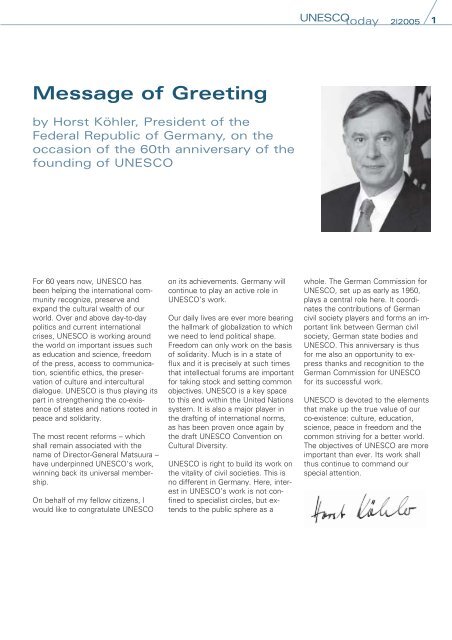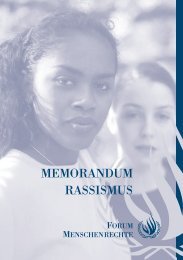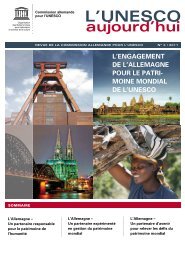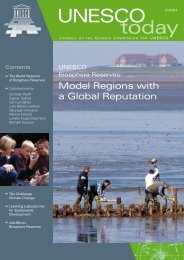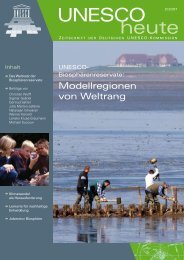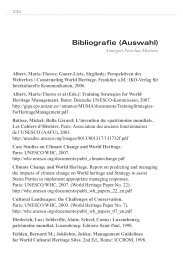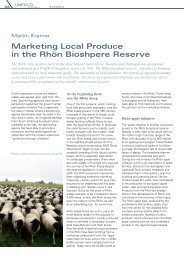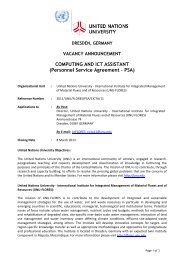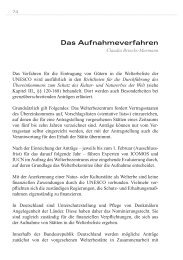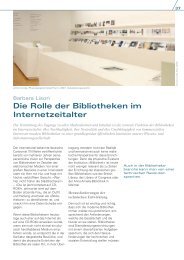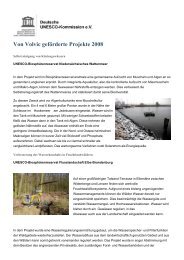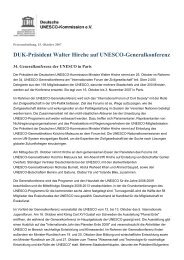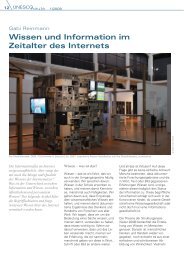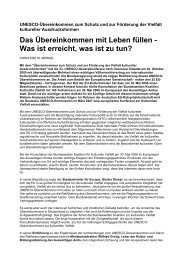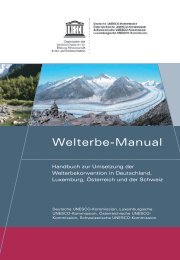Download - UNESCO Deutschland
Download - UNESCO Deutschland
Download - UNESCO Deutschland
You also want an ePaper? Increase the reach of your titles
YUMPU automatically turns print PDFs into web optimized ePapers that Google loves.
Message of Greeting<br />
by Horst Köhler, President of the<br />
Federal Republic of Germany, on the<br />
occasion of the 60th anniversary of the<br />
founding of <strong>UNESCO</strong><br />
For 60 years now, <strong>UNESCO</strong> has<br />
been helping the international community<br />
recognize, preserve and<br />
expand the cultural wealth of our<br />
world. Over and above day-to-day<br />
politics and current international<br />
crises, <strong>UNESCO</strong> is working around<br />
the world on important issues such<br />
as education and science, freedom<br />
of the press, access to communication,<br />
scientific ethics, the preservation<br />
of culture and intercultural<br />
dialogue. <strong>UNESCO</strong> is thus playing its<br />
part in strengthening the co-existence<br />
of states and nations rooted in<br />
peace and solidarity.<br />
The most recent reforms – which<br />
shall remain associated with the<br />
name of Director-General Matsuura –<br />
have underpinned <strong>UNESCO</strong>’s work,<br />
winning back its universal membership.<br />
On behalf of my fellow citizens, I<br />
would like to congratulate <strong>UNESCO</strong><br />
on its achievements. Germany will<br />
continue to play an active role in<br />
<strong>UNESCO</strong>’s work.<br />
Our daily lives are ever more bearing<br />
the hallmark of globalization to which<br />
we need to lend political shape.<br />
Freedom can only work on the basis<br />
of solidarity. Much is in a state of<br />
flux and it is precisely at such times<br />
that intellectual forums are important<br />
for taking stock and setting common<br />
objectives. <strong>UNESCO</strong> is a key space<br />
to this end within the United Nations<br />
system. It is also a major player in<br />
the drafting of international norms,<br />
as has been proven once again by<br />
the draft <strong>UNESCO</strong> Convention on<br />
Cultural Diversity.<br />
<strong>UNESCO</strong> is right to build its work on<br />
the vitality of civil societies. This is<br />
no different in Germany. Here, interest<br />
in <strong>UNESCO</strong>’s work is not confined<br />
to specialist circles, but extends<br />
to the public sphere as a<br />
<strong>UNESCO</strong> today<br />
2|2005<br />
whole. The German Commission for<br />
<strong>UNESCO</strong>, set up as early as 1950,<br />
plays a central role here. It coordinates<br />
the contributions of German<br />
civil society players and forms an important<br />
link between German civil<br />
society, German state bodies and<br />
<strong>UNESCO</strong>. This anniversary is thus<br />
for me also an opportunity to express<br />
thanks and recognition to the<br />
German Commission for <strong>UNESCO</strong><br />
for its successful work.<br />
<strong>UNESCO</strong> is devoted to the elements<br />
that make up the true value of our<br />
co-existence: culture, education,<br />
science, peace in freedom and the<br />
common striving for a better world.<br />
The objectives of <strong>UNESCO</strong> are more<br />
important than ever. Its work shall<br />
thus continue to command our<br />
special attention.<br />
1


